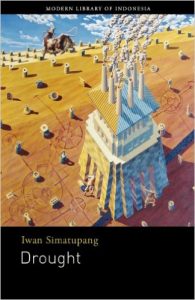Indonesia, the world’s largest archipelago, is the Guest of Honor at the Frankfurt Book Fair 2015. This is a reason to use the opportunity to read some Indonesian literature – but it is not the only one. Indonesia is also a country with an immensely rich culture, and it is also the country with the world’s biggest Muslim community – and Indonesian Islam is very different from Islam in the Arab world. It has also achieved a quite successful transition from a corrupt authoritarian regime to a quite vibrant democracy that despite some problems is without doubt a success story. (Ok, since I lived in Indonesia, I feel a great nostalghia and am very fond of this country and its people – one reason more for me to read books from Indonesia.)
The dominating Javanese and Balinese cultures have traditionally a strong focus on performative art: wayang theater, dance and ballet, poetry performances, gamelan music. Poetry readings are very popular, and the same goes for theater performances in general; but Indonesians usually don’t read much and buy even less books. The national literature is not a subject in school, and even world class authors like Pramoedya Ananta Toer, the grandmaster of Indonesian literature and Nobel Prize candidate, are unknown to many Indonesians. Only very recently things seem to change a bit: there is a quite generous grant program for translations of Indonesian literature (in English and German), several established literature festivals in Bali, Jakarta, and Makassar are becoming more and more popular, some younger authors, predominantly female, have bestsellers that are really widely read among younger Indonesians – in one word: many Indonesians discover the book and literature in general.
A pioneer in bringing Indonesian literature to foreign readers is the Lontar Foundation, which has published over the years a growing number of Indonesian “classics”. One of these I am reviewing here, Iwan Simatupang’s novel Drought, first published 1972, two years after the early death of its author.
The unnamed hero of the novel, an ex-student, ex-soldier/independence war hero, and ex-bandit decides to participate in the big Indonesian experiment of transmigrasi (transmigration) and to start a new life as a farmer on one of the outer islands of Indonesia.
Transmigration was a huge program of the government of dictator Suharto that aimed officially at a better balance of population on the different islands of Indonesia. The government promised land and all kind of other incentives to mainly poor farmers from the overpopulated island of Java that had been willing to resettle on the other (usually not so fertile) islands. As a result, millions and millions of mainly Javanese people migrated within Indonesia, and it is easy to fathom that this was not only a gigantic transfer of population, it resulted also in many internal problems, starting from hunger and epidemics to which the transmigrants were frequently exposed, to environmental problems as a result of deforestation of huge areas, to ethnic and religious clashes between the frequently Christian autochthon population and the predominantly Muslim Javanese migrants. As a byproduct, almost all islands have now an ethnic majority of Javanese that are and were viewed as being more loyal to the Javanese-dominated central government in Jakarta than the local populations. Judging from today’s standpoint, the whole transmigration project can be considered as a huge failure that instead of improving the life of farmers turned out to be a scheme that was spreading poverty all over the archipelago.
Our hero is willing to fight the drought that the village where he re-settled has to face; while the whole village leaves because of the unbearable drought, he is struggling alone left to his own devices. However, he has not only to fight nature, but also later a number of equally unnamed agents of society and the government: a doctor who seeks to cure his “madness”, or an official of the transmigrasi office that wants to send him back to the same village that is suffering from the terrible drought again after he is released from hospital. But he meets also people who treat him as friend – a smuggler (“the little fat man”), his concubine (“VIP”), and a former guerilla fighter turned bandit (“Beard”).
Simatupang’s characters are all without names – they are not only to be considered as individuals but as symptoms of Indonesian society in the 1960s. The smuggler, the bandit, the concubine, and the hero of the novel are failures in the eye of the society, but they show much more humanity and good-naturedness as the representatives of the system for which transmigration stands for. Simatupang is frequently using humor and irony in the novel to expose the pomposity, arrogance and hypocrisy of “official” Indonesia. According to the translator Simatupang
“delights in exaggerating scenes to incredible lengths, and in the to-and-fro of outraged logic.”
That is particularly true for the scene in which the author describes how a committee of university officials is holding a meeting in which they discuss if and how the university can get rid of this student that is questioning the rules and the authorities so much that it is simply unbearable for some of the professors; just when the heated discussion comes to a stalemate and several participants are on the verge of a nervous breakdown, a message of the hero comes in that he resigns from attending the university on his own will – and with a twist, the author adds that the hero liked the lessons of that professor most who was the most persistent advocate to get him removed from the campus – very embarrassing for those professor who looks now in the eyes of his colleagues (and the readers) like a complete ass. These kind of ironic twists are quite frequent in Simatupang’s novel and make it an entertaining read.
Despite this rather critical approach of the author and his hero towards Indonesian society, the novel ends on a rather optimistic note. The hero, having been going through a long and sometimes painful educative process, realizes that only in living in the company of his fellow-men he can turn his back to failure. If he will finally succeed with his undertaking does not matter so much – at least he will have tried.
“Where to? He didn’t know. Nor did he care. – A new passion seized him. He rolled up his sleeves. He stretched out his hands to the men standing stiffly on the truck. – “Let’s go!””
Drought is an interesting novel, and not only because of its somewhat exotic setting; it is making the reader curious to get to know more about Indonesian literature. The big number of newly translated titles this year is an excellent opportunity to discover this archipelago also via its literature. Make your choice!

Iwan Simatupang: Drought, Lontar, transl. Harry Aveling, Jakarta 2012
© Thomas Hübner and mytwostotinki.com, 2014-5. Unauthorized use and/or duplication of this material without expressed and written permission from this blog’s author and/or owner is strictly prohibited. Excerpts and links may be used, provided that full and clear credit is given to Thomas Hübner and mytwostotinki.com with appropriate and specific direction to the original content.





 Facebook
Facebook RSS
RSS Twitter
Twitter